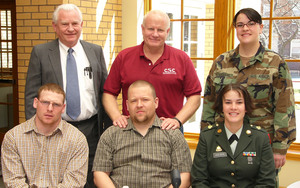Aftermath of war can be tough, veterans say

The theme of this year’s Mari Sandoz Heritage Society’s conference was “The Tom Walker,” a Sandoz book filled with tense and heartbreaking stories about the aftermath of war in a family with three generations of military veterans.
One of the sessions during the conference on Friday was a panel discussion by six contemporary veterans from Chadron, several of whom also experienced tough times both while serving their country and afterwards.
Two of the panel members are Vietnam veterans who now teach at Chadron State. The remaining four are CSC students who served with the 1057th National Guard Transportation Company that spent a year in Iraq in 2003-04.
According to their stories, there was a stark contrast in the way the panel members were treated after they returned home. Both of the Vietnam vets, Dr. Tim Donahue and Loren Zimmerman, said they were treated so badly that they often wished they were back in Vietnam.
“The saddest part of my whole experience may have been the horrible sense of loneliness and rejection that I experienced after I was home,” said Zimmerman, a criminal justice professor. “We were treated like a leper in our own country after we returned. Because of that I hated Americans and wanted to go back to Vietnam.”
After his initial experiences following his tour of duty, Zimmerman said it was 10 to 12 years before he told most acquaintances that he was a Vietnam veteran.
Zimmerman added that the conference’s keynote speaker, former Sen. George McGovern “is not a friend of mine” because of McGovern’s anti-war and anti-military statements during the Vietnam War.
By contrast, the Iraqi veterans said the Welcome Home receptions in Alliance and Chadron that treated them like heroes were greatly appreciated. The panel members who served in Iraq are Chad Cary of Chadron, Lorie and Patti Hoegerl of Alliance and Casey Loomis of Hyannis.
Zimmerman was a Marine combat engineer who was in Vietnam in the mid-1960s. He said he had some good times, but became rather cold-hearted as he learned not to make friends after he lost several of them in the war.
“I still remember those who were killed,” he said. “I had to learn to survive. I can talk about some of the things that happened to other Vietnam vets, but I can’t tell you about them. I’m still a Marine at heart.”
Donahue called Vietnam “an incredibly beautiful country with a fascinating culture.” He served in the Army there in 1970-71 with the 101st Airborne Division, the Screaming Eagles. He said the combat was a sad chapter of his life. “When you lose friends, it never goes away. I also killed a lot of people and that’s not OK, but it was always in self-defense.”
Donahue added, “I don’t regret serving. I would do it again. I get frustrated seeing people tear our country down.”
He said his most difficult time came on June 10, 1971, when landed in Seattle and was spit upon, called names and had items thrown at him at the airport.
“To have this happen less than 24 hours after I’d been in combat, they don’t know how close they came to dying.”
The CSC business professor had a special quote, “For those who have fought for it, freedom has a taste the sheltered shall never know.”
Loomis added the reminder that “freedom isn’t free.” He said the heat and humidity of Iraq were stifling and “it smelled like a junkyard,” but indicated that his time there was worthwhile. He said he appreciated being able to keep in touch with friends and family via the Internet and telephone, something previous veterans were unable to do.
The Hoegerl twins said being a female in Iraq was “pretty miserable.” “The Marines didn’t like us,” Patti noted. But her sister indicated they were treated well by the males in the National Guard Unit. “We were like a family,” Lorie said.
Cary urged those attending the discussion not to take their wrath against war out on the servicemen and women. “Americans are entitled to their opinions, but don’t blame it (the war) on the soldiers or the Marines. They’re just doing their jobs.”
Both generations of veterans lashed out at the media coverage of war. Donahue said he sometimes wonders which side some of the U.S. media was/is on, both in Vietnam and the Iraqi war. He said some of the experiences he had in Vietnam were “completely different” than the news accounts he read later.
He added that the media “has a tough job” because both the government and the military sometimes give false information in hopes that it will confuse the enemy.
Loomis called the media in Iraq “worthless,” noting that “all it showed was the bad things.”
Patti Hoegerl agreed. “The best war would be one without the media. They never told about the schools and hospitals that were being built and the fact that we were helping hundreds of thousands of people.”
The panel was moderated by Luke Perry, assistant professor of political science at Chadron State.
Category: Campus News
